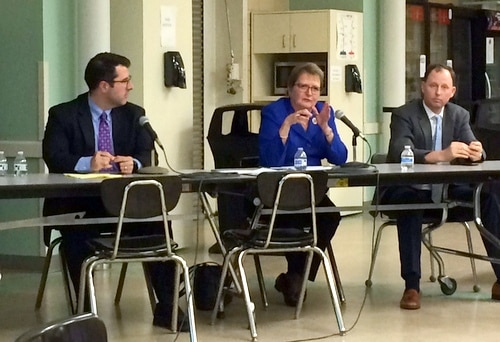
Susan Guidry (center) speaks, while Joe Giarrusso III (left) and Gordon McLeod listen during a town hall meeting on short-term rentals Monday night at St. Mary’s Dominican. (photo courtesy of Carrollton Area Network)
Although she has less than a month left in office, District A City Councilwoman Susan Guidry is continuing to advocate for tighter regulations of AirBnB and other short-term rental platforms that she originally sought two years ago — and the incoming class of council members say they are listening to her.
When the City Council was first discussing how to legalize short-term rentals in 2016, Guidry sought to add a requirement that all short-term rentals in residential neighborhoods be limited to houses with a homestead exemption, as a way of requiring that the owner actually live there. While council members Jared Brossett and LaToya Cantrell agreed with her, Guidry’s motion to add the requirement failed by a 3-4 vote — so Guidry ultimately voted against the entire set of laws legalizing short-term rentals.
“I decided the regulations didn’t provide enough protection for neighborhoods,” Guidry said on Monday night in a town-hall forum on short-term rentals organized by the Carrollton Area Network.
Now, the number of short-term rental licenses issued by the city has grown to 4,500, beyond the range of 2,500 to 4,000 originally estimated by city planners and continuing to grow, according to data gathered by Steve Myers, editor of The Lens. Of those licenses, 72 percent allow an entire home to be rented for at least part of the year.
The public concept of short-term rentals as a way for homeowners to make some extra money off of their homes remains beneficial to some New Orleans residents, Guidry said. However, bad actors — such as landlords who purchase property to evict long-term renters for the faster money of AirBnB, or out-of-state companies who convert dozens of New Orleans homes into short-term rentals — are abusing the system, she said, and need to be reined in.
“If you live there, you are going to make sure that your renters are not going to destroy the quality of life for you or the people around you,” Guidry said. She added, “Really, I think the homestead exemption is the key to limiting the number we have in the city, and the key to making sure that short-term rental uses are not going to affect our quality of life.”
In her remarks and responses to residents’ questions, Guidry noted a number of other policy changes that might help as well.
- Ride-sharing companies like Uber and Lyft must have licenses themselves with the city, but AirBnB, VRBO and HomeAway do not. Requiring the platforms to obtain licenses would allow the city to more effectively regulate their conduct, and remedy issues of poor data reporting and issues about identifying scofflaws, Guidry said.
- Guidry cited a study by Jane Place showing that the $1 per host fee collected by AirBnB and remitted to the city has only generated about $230,000 for the Neighborhood Housing Improvement Fund, barely enough to create a single affordable unit in the city. While she did not have the total amount of license fees in hand, she said it is likely time to increase the taxation on short-term rentals.
- Some short-term rentals are allowed year-round in commercial and mixed-use zoning districts, and Guidry had sought in 2016 to reduce the number of mixed-use districts where commercial rentals were available, since mixed-use zoning is so frequently found in neighborhoods.
- More technical restrictions have also been proposed, such as limiting the number of short-term rentals per block, mandating a set amount of space between them, or setting caps on the density of them in a neighborhood, Guidry said, and she reiterated that all of those merit consideration as well.
Although Guidry is retiring, her perspective is likely to find fertile ground on the next City Council. Guidry’s successor, District A Councilman-elect Joe Giarrusso III, noted that he and several other incoming council members — including Jay H. Banks in District B and Kristin Palmer in District C, the two parts of the city with the highest concentration of short-term rental licenses — all campaigned on reforming the system.
The reform process has already begun, as the current City Council has instructed the City Planning Commission to begin a study of what changes need to be made now that short-term rentals have been legal for more than a year. Public comment for that study begins April 24, and the incoming City Council — which also includes Brossett, as well as mention Cantrell as mayor, both of whom were Guidry’s allies on the issue — will inherit it.
Giarrusso and Guidry both urged residents to speak loudly and clearly during the upcoming hearings, as the new council will be looking.
“A number of us ran on short-term rental reform,” Giarrusso said. “At least four of us are committed to some early action on this front.”